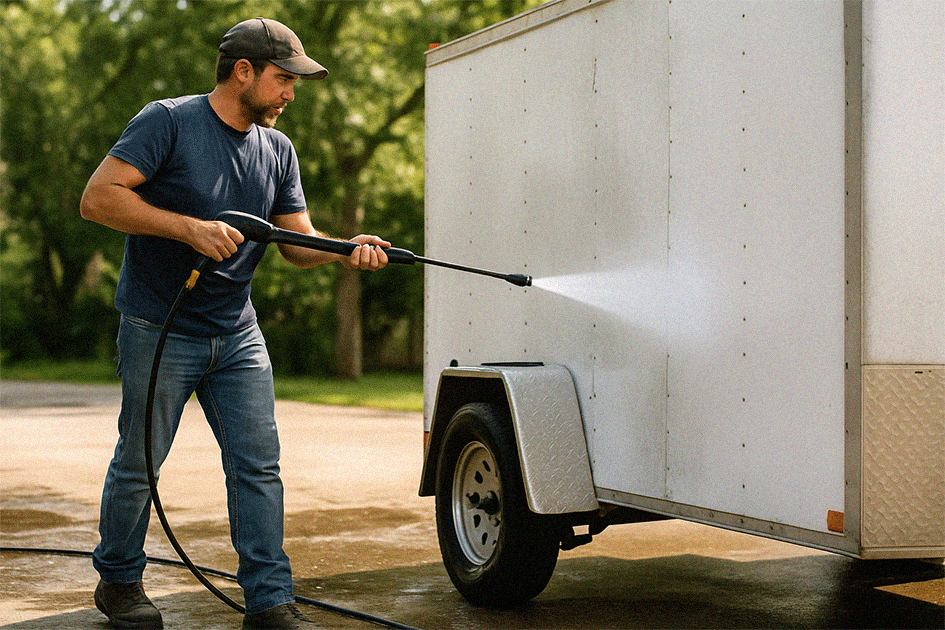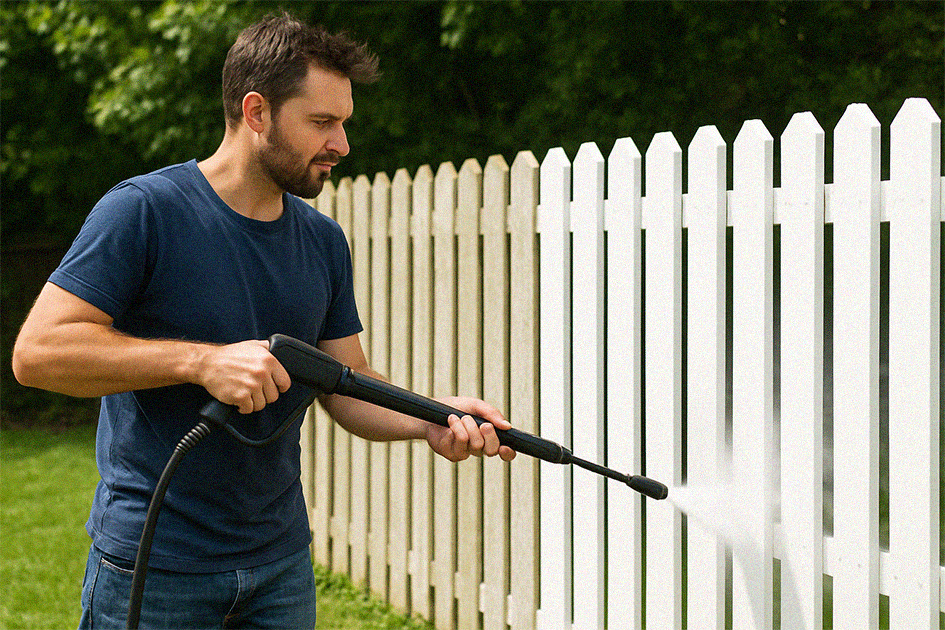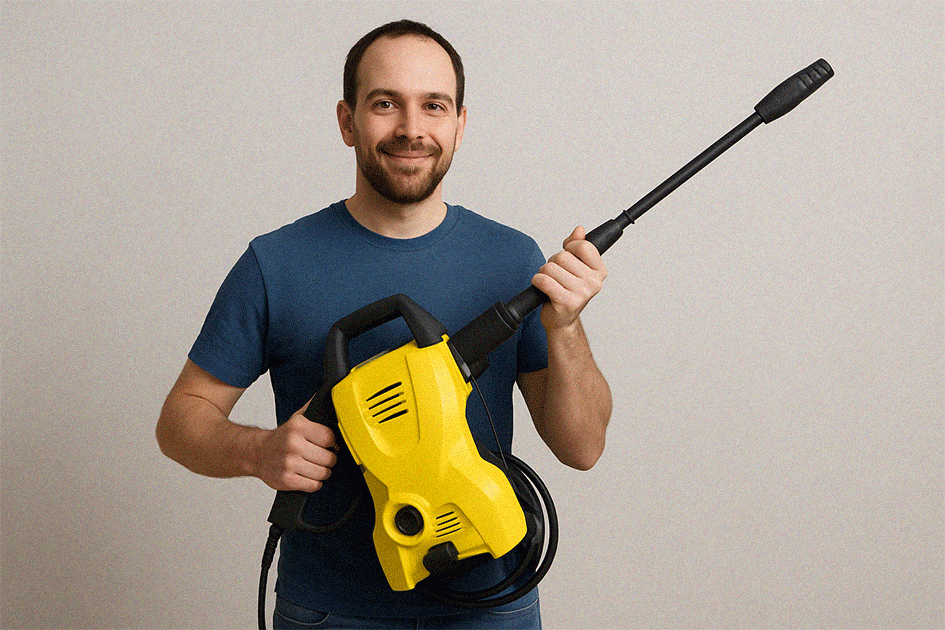
When it comes to cleaning your home's exterior, you'll often hear two terms: pressure washing and soft washing. While they might sound similar, these are actually two distinct cleaning methods, each with specific applications and benefits. Choosing the wrong method can lead to damage, while choosing the right one ensures a thorough, safe clean that lasts.
What is Pressure Washing?
Pressure washing—also called power washing—uses high-pressure water spray delivering 1,300 to 3,000+ PSI (pounds per square inch) to mechanically remove dirt, grime, mold, and stains from hard surfaces. This method relies primarily on the force of water at high pressure rather than chemical action to blast away contamination.
The mechanical approach excels at removing deeply embedded dirt and stains from durable surfaces through sheer force. Water pressure literally tears contamination away from surfaces, making pressure washing extremely effective for heavy-duty cleaning applications where surfaces can withstand the force without damage.
Ideal applications for pressure washing include concrete surfaces like driveways, sidewalks, garage floors, and patios where durability allows aggressive cleaning. Stone and brick structures—walkways, retaining walls, paver patios, and brick driveways—respond well to controlled pressure. Certain wood surfaces like deck preparation before staining benefit from careful pressure washing, while heavy staining from oil, tire marks, rust, or adhesives often requires pressure washing's mechanical force for complete removal.

The advantages of pressure washing include extreme effectiveness at removing deeply embedded contamination, speed when cleaning large hard surfaces, minimal chemical requirements (water alone often suffices), and cost-effectiveness from reduced cleaning solution needs. However, limitations exist: potential for damage on soft or aged materials, unsuitability for delicate surfaces that high pressure could harm, required skill to avoid gouging wood or forcing water behind siding, and reduced effectiveness on organic growth that may not be killed at roots.
What is Soft Washing?
Soft washing uses low-pressure water (typically under 500 PSI) combined with specialized cleaning solutions to clean surfaces gently yet effectively. This method relies on chemical action rather than force—solutions do the heavy lifting while low pressure simply rinses away loosened contamination and dead organisms.
The chemical approach works by applying eco-friendly solutions that break down and kill organic growth at its source. Chemicals penetrate deeply into porous surfaces and textured materials, killing mold, mildew, and algae at the root level. This thorough treatment prevents rapid regrowth, making soft washing results last significantly longer than mechanical cleaning alone.
Ideal applications for soft washing include virtually all siding materials—vinyl, aluminum, stucco, EIFS, and fiber cement—where high pressure could force water behind panels or damage finishes. Delicate surfaces like asphalt and composite roofing, painted wood, aged timber, decorative trim, and window screens all require soft washing's gentle touch. Surfaces with organic growth (mold, mildew, algae, moss, lichen) respond exceptionally well to soft washing's killing action. Higher elevations like second and third-story siding benefit from soft washing's safety compared to high-pressure equipment at dangerous heights.
The advantages include safety for all surfaces without risk of pressure damage, longer-lasting results from killing organisms at their source, thorough cleaning that reaches into crevices and textured surfaces, energy efficiency requiring less water and pressure, and professional-quality deep cleaning. Limitations include the requirement for proper chemical solutions and knowledge, reduced effectiveness on certain deep concrete stains compared to pressure washing, need for expertise in dilution and application, and slightly higher costs from quality cleaning solutions.
| Feature | Pressure Washing | Soft Washing |
|---|---|---|
| Pressure Level | 1,300-3,000+ PSI | Under 500 PSI (similar to garden hose) |
| Primary Cleaning Method | Mechanical force | Chemical/biological action |
| Best Applications | Concrete, stone, brick, heavy stains | Siding, roofs, wood, organic growth |
| Cleaning Speed | Very fast for hard surfaces | Takes more time for dwell |
| Result Duration | Shorter (may return quickly) | 3-4x longer lasting |
| Organic Growth | Removes but may not kill roots | Kills completely at source |
| Damage Risk | Higher on soft/delicate materials | Minimal when properly done |
| Chemical Requirements | Minimal or none | Required for effectiveness |
| Water Usage | Moderate to high | Lower overall |
| Skill Level Required | High (pressure control critical) | High (chemical knowledge critical) |
Common Misconceptions Debunked
"Pressure washing is always better because it's more powerful" represents perhaps the most dangerous misconception. More pressure doesn't mean better cleaning—in fact, excessive pressure damages many surfaces while failing to provide the deep, lasting clean that chemical action delivers. Soft washing's targeted solutions often provide superior results for organic staining, the most common exterior problem in humid North Carolina.
"Soft washing uses harsh chemicals" frightens some homeowners unnecessarily. Professional soft washing solutions are biodegradable and eco-friendly when properly diluted. They're specifically designed to be tough on dirt, mold, and algae while remaining safe for plants, pets, and the environment. The key phrase is "when properly diluted"—this is why professional application matters.
"You can use a pressure washer on any setting for any surface" oversimplifies equipment capabilities. While pressure washers have adjustable settings, simply turning down the pressure doesn't replicate true soft washing. Soft washing requires specific cleaning solutions, specialized application techniques, appropriate dwell times, and knowledge that extends far beyond pressure adjustment.
"Soft washing won't remove tough stains" underestimates chemical cleaning power. Soft washing excels at removing the toughest stains homeowners typically encounter—mold, mildew, algae, and biological growth that pressure washing may remove from surfaces but fail to kill at roots. The stains where pressure washing has clear advantages are concrete-specific: oil stains, deep rust discoloration, and embedded tire marks.

Surface-by-Surface Guide
Understanding which method suits specific surfaces prevents costly mistakes and ensures optimal results.
Vinyl siding requires soft washing exclusively—high pressure forces water behind panels, potentially causing interior water damage, mold growth, and structural issues. Aluminum siding needs soft washing to prevent denting and finish damage that pressure creates. Wood siding demands soft washing; pressure splintering and damaging delicate wood fibers irreversibly. Brick accepts light pressure washing or soft washing depending on mortar condition—old, soft mortar requires gentle soft washing while hard, new mortar tolerates controlled pressure. Stucco must receive soft washing only, as pressure cracks and damages the textured finish that's nearly impossible to repair invisibly.
Asphalt shingles absolutely require soft washing—pressure literally dislodges protective granules, dramatically shortening roof life. Metal roofing prefers soft washing to prevent finish damage and maintain warranties. Tile roofing accepts soft washing or very low-pressure washing depending on tile type and age.
Concrete driveways represent pressure washing's ideal application—they handle heavy stains and traffic wear that demands mechanical force. Wooden decks require soft washing or very low-pressure washing to protect wood fibers from damage. Composite decks need soft washing; pressure can damage composite materials' surface layer and void warranties. Stone patios accept light pressure washing depending on stone hardness and mortar condition.
Wooden fences benefit from soft washing that preserves wood integrity and prevents splinterin
g. Vinyl fences require soft washing to prevent warping and damage. Gutters need soft washing on exteriors to protect painted or coated finishes.
| Surface Type | Recommended Method | Why | Pressure Limit | Special Considerations |
|---|---|---|---|---|
| Vinyl Siding | Soft washing only | Prevents water infiltration | Under 500 PSI | High pressure forces water behind panels |
| Asphalt Shingles | Soft washing only | Preserves protective granules | Under 500 PSI | Pressure voids warranties |
| Wood (any) | Soft washing preferred | Prevents splintering/damage | Under 600 PSI | Pressure can gouge and splinter |
| Stucco/EIFS | Soft washing only | Prevents cracking | Under 500 PSI | Pressure damages textured finish |
| Concrete | Pressure washing | Handles heavy stains | 2,500-3,500 PSI | Adjust for decorative finishes |
| Brick | Either (depends on mortar) | Varies by age/condition | 800-1,500 PSI | Old mortar needs gentle approach |
| Composite Decking | Soft washing | Protects surface layer | Under 500 PSI | Pressure voids warranties |
The Best Approach: Combination Cleaning
Professional exterior cleaning rarely involves choosing one method exclusively. The best results come from using both methods where appropriate based on surface characteristics. A comprehensive property cleaning might include soft washing the house siding for safe, thorough results, pressure washing the concrete driveway to remove deep oil stains, soft washing the deck to protect wood integrity, pressure washing walkways for quick effective cleaning, and soft washing the roof to kill algae without damage.
This tailored approach ensures every surface receives optimal treatment without risk of damage while delivering superior cleaning that lasts. One-size-fits-all approaches either leave surfaces inadequately cleaned or risk expensive damage.
Why Professional Knowledge Matters
DIY pressure washing might seem straightforward, but proper surface cleaning requires expertise that prevents costly mistakes. Technical knowledge includes understanding PSI requirements for different materials (too much destroys, too little fails), knowing chemical dilution ratios for effective safe soft washing, recognizing surface conditions requiring special care, and identifying growth types to choose correct treatments.
Proper equipment extends beyond consumer rental units to multiple pressure settings or separate equipment for different applications, quality soft washing systems with appropriate nozzles and tanks, professional-grade cleaning solutions unavailable in retail stores, and safety equipment for working at heights or with chemicals.
Experience provides technique refinement for even thorough cleaning without streaking, problem-solving skills for challenging stains or unusual surfaces, efficiency that comes from years of daily practice, and damage prevention through instant recognition of risk factors.

Cost and Value Considerations
Soft washing often costs slightly more than pressure washing due to specialized solutions and longer dwell times, but long-term value reveals the full picture. Soft washing on siding carries slightly higher initial cost but delivers results lasting 3-4 times longer, prevents damage that could cost thousands to repair, and provides overall better value through extended cleanliness. Pressure washing on concrete offers lower per-square-foot costs, may require more frequent cleaning for organic growth, but proves extremely effective and appropriate for intended hard surfaces.
Consider avoided damage costs: replacing damaged vinyl siding costs $8,000-$20,000, replacing granule-damaged roofing costs $8,000-$15,000, and repairing pressure-damaged wood siding costs $3,000-$10,000. Proper method selection prevents these expensive mistakes while delivering superior cleaning.
Environmental Responsibility
Both methods can be environmentally responsible when properly executed. Soft washing uses biodegradable solutions, requires less water overall, employs cleaning agents designed to break down safely, and must be applied by professionals understanding proper dilution for ecological safety. Pressure washing uses only water in many cases, can use excessive water if operators aren't careful, creates runoff that may carry pollutants, and should involve capturing and properly disposing of contaminated water.
Professional companies take environmental responsibility seriously, using eco-friendly products, following best practices for runoff management, complying with local regulations, and protecting waterways and landscaping throughout the cleaning process.
Making the Right Choice
When deciding between methods, consider: What material am I cleaning (hard/soft, delicate/durable)? What type of soiling exists (organic growth vs. concrete stains)? How old is the surface (aged materials need gentler care)? What are damage risks (worth the risk to use high pressure)? What results do I want (quick clean vs. long-lasting deep clean)?
Professional companies like Exterior Shine don't force you to choose—they have expertise in both methods and know exactly when to use each. You get surface-specific approaches tailored to your property, combination cleaning using the best method for each area, professional-grade equipment for both techniques, experienced technicians recognizing what each surface needs, and guaranteed results without damage risk.
Ready to Get the Right Clean?
Understanding the difference between pressure washing and soft washing helps you appreciate the expertise required for proper exterior cleaning. Whether your driveway needs pressure washing's power or your siding requires soft washing's gentle thoroughness, the right method makes all the difference between beautiful results and expensive damage.
Contact Exterior Shine at (704) 980-9859 for a free consultation. We'll assess each surface individually, explain which cleaning methods your property needs and why, and deliver exceptional lasting results through professional technique selection. Don't risk damage by guessing—trust the professionals who know exactly what your property needs.

Scott Deviney
Co-Founder & Customer Relations
Scott handles all aspects of customer service and ensures that every client receives the personalized attention they deserve. With a background in business management and a genuine passion for helping people, he's built Exterior Shine's reputation for outstanding customer care.
